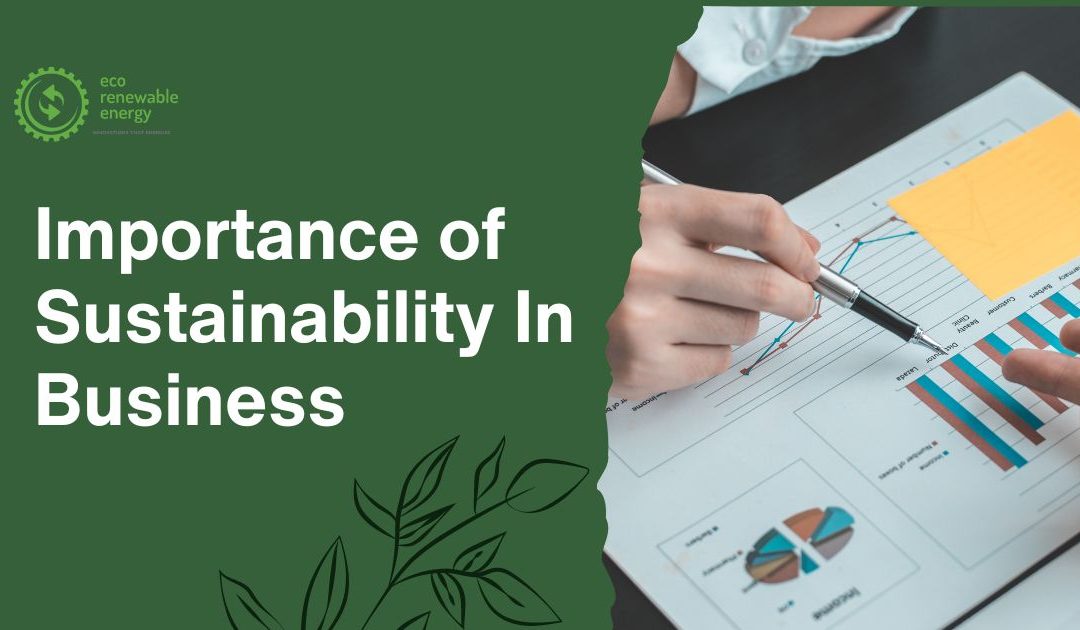Table of Contents
In the bustling city of Sydney, Australia, the importance of sustainability in business is becoming increasingly apparent. Businesses are recognizing the need to shift towards more sustainable practices, not just for the environment but also for their bottom line. Sustainability is important in business because it ensures long-term profitability by reducing costs, enhancing brand reputation, and meeting consumer demand for environmentally and socially responsible practises. It also helps businesses comply with regulations, mitigate risks, and contribute to the well-being of the planet and society. But what exactly is corporate sustainability, and why should you care? Let’s break it down.
What is Corporate Sustainability?
Before we proceed with why corporate sustainability is important, we need to know what corporate sustainability is. We can define corporate sustainability as a strategy where a business organisation delivers its services and products in such a way that it is environmentally sustainable and also helps in economic growth. Corporate sustainability focuses on long-term benefits to the organization as well as the environment. Your organisation should commit to using natural resources sustainably, making investments for the long-term health of the environment, and ensuring that everyone involved in your eco-friendly business process is treated equitably by establishing a corporate sustainability strategy.
Businesses adopt a holistic approach to managing financial, social, and environmental risks. It’s about making decisions that benefit the company and positively impact society and the environment. No one can overstate the importance of sustainability in business.
What are the 3 Pillars of Sustainability?
Along with sustainability in the environment, businesses must also follow the three pillars of sustainability for the overall upliftment of their business:
- Environmental Sustainability: This involves businesses making decisions and taking actions that are in the interests of protecting the natural world, emphasising preserving the environment’s capability to support life.
- Social Sustainability: This pillar involves businesses ensuring they positively impact society. It includes aspects like human rights, labor rights, corporate governance, and managing environmental impact.
- Economic Sustainability: This involves the business’s ability to generate profit while ensuring a positive economic impact on the society in which it operates.
Real-World Impact: By installing our energy floors and Smart Solar Benches in high-traffic areas, we’ve provided businesses with a tangible way to demonstrate their commitment to sustainability, which also enhanced their brand reputation and customer loyalty.
Importance of Sustainability in Business
The importance of corporate sustainability is becoming increasingly clear. Here are some reasons why:
- Long-Term Viability: In a world grappling with climate change, resource depletion, and social inequality, businesses that prioritise sustainability are more likely to thrive in the long run. By integrating sustainable practises, companies future-proof their operations, ensuring their continued existence and relevance.
- Regulatory Compliance: Governments worldwide are implementing stricter environmental regulations and social standards. Businesses that proactively adopt sustainable practises stay ahead of regulatory requirements, minimizing legal risks and potential penalties.
- Customer Expectations: Today’s consumers are increasingly conscious of their purchasing decisions and favour businesses that demonstrate social and environmental responsibility. In business, sustainability practices can build trust, loyalty, and customer satisfaction, leading to increased market share and brand preference.
- Attracting Top Talent: Sustainable companies are more attractive to the modern workforce, particularly among younger generations who prioritise purpose-driven work and aligning personal values with their employers. By promoting sustainability, businesses can recruit and retain skilled employees who are passionate about making a positive impact.
Challenges of Sustainability For Any Business
While the importance of sustainability in business is clear, it does come with its own set of challenges:
- Cost: Implementing sustainable practises in business often requires a significant upfront investment
- Resistance to Change: Employees and management may resist the changes necessary to implement sustainable practises.
- Lack of Knowledge: Many businesses lack the knowledge and expertise to implement sustainable practises effectively.
- Regulations: There are a variety of regulations governing environmental sustainability, which can be complex and time-consuming to comply with.
Benefits of Sustainability in Business
Integrating sustainability into business practises can yield numerous benefits. Sustainability in business includes several major benefits, such as:
- Cost Savings: Sustainable practices often reduce energy and resource consumption, resulting in cost savings over time. For example, implementing energy-efficient technologies can lower utility bills, while waste reduction initiatives can minimize disposal expenses.
- Enhanced Brand Reputation: Embracing sustainability can enhance a company’s brand reputation. Consumers today are increasingly conscious of environmental and social issues. By demonstrating a commitment to sustainability, businesses can attract environmentally and socially conscious customers and build long-term loyalty.
- Improved Risk Management: Sustainability practices can help businesses identify and mitigate potential risks. For instance, diversifying supply chains can reduce the impact of disruptions while addressing social issues can prevent reputational damage actively.
- Access to New Markets: Many consumers prefer sustainable products and services. By adopting sustainable practices, businesses can tap into new market segments and attract environmentally aware customers who prioritise sustainability in business when purchasing.
- Environmental Benefits: By focusing on sustainability, businesses can significantly reduce their carbon footprint, leading to a positive impact on the environment and aligning with global efforts to combat climate change.
How To Achieve Sustainability For Your Business?
Achieving sustainability for your business can be a complex process, but here are a few steps to get you started:
- Set sustainability goals: The first step is to set clear goals for your business. This will help you to focus your efforts and track your progress.
- Understand your environmental impact: It is important to understand your business’s environmental impact to identify areas where you can make improvements.
- Implement sustainable practices: There are many sustainable practises that businesses can implement, such as using recycled materials, reducing energy consumption, and minimising waste.
- Measure your progress: Measuring your progress against your sustainability goals is important to see how you are doing and to make necessary adjustments.
Why Sustainable Branding Matter?
A sustainable brand is one that has successfully integrated environmental, economic, and social issues into its socially responsible business operations. Organisations are working on incredible sustainability initiatives. The common challenge is raising awareness among the target audience and getting their engagement.
At Eco Renewable Energy, we aim to educate, inspire & promote sustainability in business through interactive innovations of renewable energy. We plan on achieving environmental sustainability by setting proper sustainable development goals and working towards our target. We do this using our range of innovations which are hired out for events & brand activations. We install these permanently in schools, universities, airports & public spaces across Australia & New Zealand. Our events and campaigns are focused on promoting the importance of corporate sustainability and sustainable branding.

Raising Awareness: People Are Ready for Sustainable Brands
In Sydney, as in the rest of the world, people are becoming more aware of the importance of sustainability. They are ready for sustainable brands that align with their values and are making purchasing decisions accordingly.
It’s clear that consumers prefer sustainable brands. But without proper messaging to reach your audience and show them what your brand is doing, they will end up with your competitors.
A building may be running entirely on renewable energy, but… occupants still plug their devices into the same wall point and the great sustainability initiatives get forgotten. Eco Renewable Energy provides interactive innovations that are powered either by Kinetic (pedaling or jumping) or Solar energy and bring Sustainable Brands to life in an experiential way.
Feedback shows that in buildings with our installed innovations, the occupants’ perception of a sustainable company was significantly higher due to their interaction & engagement. The audience was able to take in new messages attributed to our innovations because of their engaging and interactive nature.
Social Challenges
In recent years, as we’ve progressed deeper into the digital age, our culture has steadily decreased their everyday physical movement. Instead, we seek comfort in office chairs or sofas with the luxuries of laptops and Netflix.
We, therefore, encourage workplaces to design a space where occupants feel, see, create, and experience renewable energy using their movement. If not workplaces, then event & brand activation setups that educate, inspire, and promote sustainability. This will indirectly encourage health, wellness, and human movement with active learning for people of all ages. Specifically focusing on youth activities to inspire the next generation to think & design sustainably and promote sustainable practises among the youth.
A Real Connection
The challenge lies in helping CEOs feel connected to these issues, especially if they don’t see returns from investing in sustainability. This barrier must be overcome first before an organisation as a whole can commit to its corporate sustainability & becoming a more sustainable green business.

The Future of Sustainability in Business
The future of sustainability in business looks bright, with more and more companies recognising the importance of corporate sustainability.
Looking Ahead: We’re excited about the potential for sustainability to transform industries and communities. Our work in promoting renewable energy through engaging experiences is just one example of how businesses can lead the way in sustainability.
The greatest realisation brands must make is that sustainability goes beyond caring for the environment. It involves three major aspects — environmental, economic, and social – each of which must be taken into consideration for a true sustainability strategy. Finding a strong engaging medium to communicate these key points is essential.
AC Nielsen reports tracked the steady growth of sustainability brands with messaging of “All natural,” “fair trade,” and “organic”— there are more and more products across stores.
AC Nielsen concludes, “No matter what, sustainability is no longer a niche play: your bottom-line and brand growth depend on it.”
Why Is Sustainability Important for Future Generations?
Sustainability is important for future generations because it ensures they have the resources to live and thrive. It’s about leaving the world in a better place than we found it. Sustainability is critical for the well-being of future generations. Here’s why:
- For Preserving Natural Resources
- For Mitigating Climate Change
- For Social Equity and Justice
- For Reducing the Carbon Emissions
For Example: Our recent collaboration with local schools to integrate interactive renewable energy technologies has educated students and also sparked their interest in pursuing careers in sustainability.
Does Sustainability Matter to You?
The importance of corporate sustainability is not limited to businesses; it is also relevant to individuals. Each individual’s actions contribute to the collective impact. Here are some ways sustainability matters to you:
- Health and Well-being: Sustainable living promotes a healthier lifestyle by encouraging physical activity, reducing exposure to harmful substances, and supporting clean and safe environments.
- Financial Savings: Embracing sustainable practices can help you save money in the long run. Energy-efficient homes, reduced water consumption, and conscious consumption habits can lower utility bills and overall expenses.
- Positive Impact: You become an agent of change by adopting sustainable habits. Your choices can inspire others and contribute to a more sustainable future. Your actions matter whether it’s recycling, reducing waste, or supporting sustainable brands.
So, does sustainability matter to you? It’s not just about the big picture; it’s about making choices that benefit both the planet and your own well-being.
Check Out: 7 Sustainable Events Ideas
Conclusion
Embracing sustainability is not just a trend but a crucial strategy for businesses aiming to thrive in today’s world. Corporate sustainability encompasses more than just environmental responsibility—it involves a comprehensive approach that integrates economic and social dimensions to ensure long-term success and positive impact. By adopting sustainable solutions, businesses can enjoy cost savings, enhance their brand reputation, and appeal to a growing base of environmentally and socially conscious consumers.
As we look to the future, the importance of sustainability for businesses and individuals alike becomes increasingly clear. It is about safeguarding resources for future generations, addressing climate change, and promoting social equity. At Eco Renewable Energy, we are dedicated to driving this change and helping organisations integrate sustainable practices into their operations.
To learn more about how we can assist your business in becoming more sustainable, contact Eco Renewable Energy at info@ecorenewableenergy.com.au. Together, we can build a sustainable future and make a meaningful impact on our planet.




Recent Comments